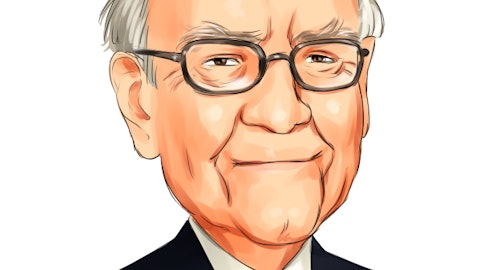We monitor insider purchases by company officers and Board members because statistically these purchases tend to be associated with higher returns (see our discussion of studies on insider trading). We think that this is because insiders already depend on good performance at the company; in order to ignore the benefits of diversification, they must be particularly confident that it will do well. Here are some insider purchases that we have noted in the last several days:
James Grosfeld, a member of BlackRock, Inc. (NYSE:BLK)’s Board of Directors, bought a total of 300,000 shares of the company between his own direct purchases and those bought by related parties such as a trust. At the current stock price, this was about $57 million in stock (read about the insider buy at BlackRock). BlackRock’s investment advisory revenues were up slightly in the third quarter of 2012 versus a year earlier, with investment income helping drive up earnings at a double-digit rate. At 15 times trailing earnings, and paying a dividend yield of 3.1%, we think that there is a good value case here and the insider buy is certainly large enough to be notable.
Wells Fargo & Company (NYSE:WFC) was another financial stock seeing buying from a Board member, as Stephen Sanger purchased 10,000 shares on October 17th at an average price of $33.96 per share. Sanger had previously bought shares in January 2009, and has seen a 73% gain since then. With Wells Fargo lagging many other banks- it is about flat over the last three months, while banks such as Citigroup and Bank of America have soared- he may believe that the market is not giving its business enough credit. It does trade at a premium to the book value of its equity, at a P/B of 1.3, but it trades at only 9 times forward earnings estimates. Learn more about how Wells Fargo stacks up against the other banks. We do think that Wells Fargo is approaching the point where it is once again a better buy than the rest of the industry.
Board member Patricia Fili-Krushel reported a purchase of 2,500 shares of Dollar General (NYSE:DG). The discount retail store is actually about even with the S&P 500’s performance over the last year, though it should be noted that statistically it has a beta of 0.1 and so should have much less downside risk in a bear market. In its most recent quarter its earnings were up 47% from the same period in 2011, yet it trades at a trailing P/E of only 18. Wall Street analyst consensus implies a forward P/E of 14 and a five-year PEG ratio of 0.9. We think it could be considered for “growth at a reasonable price” with an earnings multiple not that much higher than that of Target or Walmart.
We’d recently discussed an insider buy at regional bank PrivateBancorp Inc (NYSE:PVTB) and now we’ve seen a second insider, Board member Bruce Nicholson, purchase 6,000 shares at an average price of $17.06. Consensus insider buys are particularly likely to lead to positive returns, as we mentioned in our analysis of studies of insider trading. When we had looked at PrivateBancorp, it hadn’t looked too appealing from a pure value perspective- a P/B of 1.1, and a trailing P/E of 24- but its earnings had been on the rise. In fact, annualizing its most recent quarter had yielded a P/E multiple of 16. If these insiders think the bank can continue growing, it makes sense for them to buy.
Finally, small manufacturer of polyester and nylon yarn Unifi, Inc. (NYSE:UFI) saw an insider purchase from Board member Kenneth Langone. Unifi’s market cap of about $265 million places it at 24 times trailing earnings, higher than where we’d feel comfortable buying a small manufacturing stock. Its forward P/E is 7, but with revenue and earnings down in its most recent quarter compared to the same period in the previous year we’re skeptical of that level of optimism. We would avoid it.






